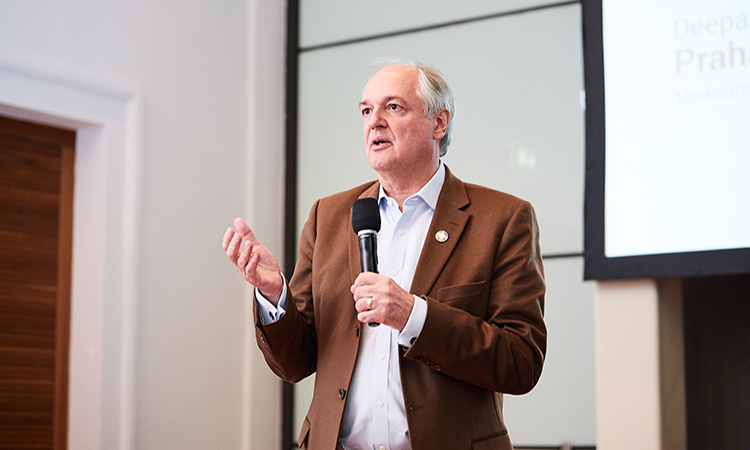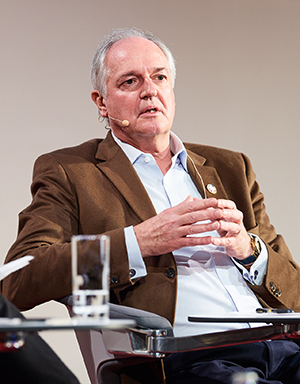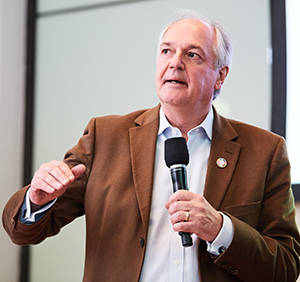Paul Polman: A sustainable leader making global changes
Former chief executive officer (CEO) of Unilever, Paul Polman, shows us how global change must originate from leaders of large organizations.

Former chief executive officer (CEO) of Unilever, Paul Polman, shows us how global change must originate from leaders of large organizations. Large organizations are the ones with the resources and experience necessary to generate real change. He has created an ecosystem of organizations that allows the implementation of sustainable business strategies and promotes systemic change. His work as the president of the International Chamber of Commerce, chair of B Team, and vice president of the United Nations Global Compact reinforces his work and standing.
Here is a summary of an interesting talk at the Global Peter Drucker Forum, supported by Brightline.
Four challenges to change the world
 I have always believed in the force of “shared value,” that my great friend Michael Porter proposes, but I believe that this theory nowadays is not enough. Today we need leaders who drive the transition, who promote transformative changes beyond their needs and interests, who go beyond the activity of the company with the aim of impacting as many people as possible.
I have always believed in the force of “shared value,” that my great friend Michael Porter proposes, but I believe that this theory nowadays is not enough. Today we need leaders who drive the transition, who promote transformative changes beyond their needs and interests, who go beyond the activity of the company with the aim of impacting as many people as possible.
It’s great to work in a company that produces clean energy and boosts its development, but its activity is limited to the environment that surrounds the organization, which is precisely the space in which Porter develops his theory. However, as a society now, we face greater challenges and we need to make an impact on bigger environments.
Among the challenges never faced before, the first would be the decarbonization of the world economy. We are coal "junkies." We never were interested in how to grow our economy without using this mineral, which has become the main source of pollution on the planet.
According to reports prepared by the Intergovernmental Panel on Climate Change (IPPC), the consequences and costs of increasing 1.5 degrees in global warming will be much worse than expected. We are dramatically playing with the future of humanity, and the poorest people will be the first to pay the price of this disaster.
The second change that we must address is that of moving from a linear consumption model to a circular consumption model. A few years ago, when the population level was not excessively high and resources abounded, the situation was different. But today, with an overcrowded planet, we cannot continue digging into the earth to extract its resources and then throw our waste back to the earth.
We have not yet discovered how to move from a linear to a circular economy, but if we stop to reflect, we will realize that nature has no waste. We, humans, have invented garbage and, as we have created it, we can devise ways to quickly get rid of it.
The third challenge is very simple: creating a more inclusive economic system. Last year, 87% of global economic growth went to 1% of the population. This means that eight people in the world accumulated the same wealth as 3.5 billion people. Any system in which most people consider that they are not participating in wealth, are not being included, or do not have the same opportunities will end up rebelling; that is what is beginning to happen.
The fourth and final challenge is to transform the way in which financial markets act so that they work based on the long term and not under the parameters of immediacy. It is impossible to solve problems like climate change, poverty, and feeding the world’s population with a quarterly approach designed to bring a return to shareholders.
Driving a re-humanizing leadership
There are 17 Sustainable Development Goals that are easy to achieve and that are also good for the well-being of humanity. If we know how to build houses, why are there still people who do not have homes? If we have learned to grow food, why do we waste large amounts while 840 million people go to bed hungry? It’s not a technology problem but an exercise of will.
We are aware that if we continue to generate CO2 emissions, islands where families now live will disappear. We understand that by buying t-shirts at one dollar we encourage the slave labor of children in Bangladesh. Yet we keep doing it. That is why I wonder: do we really care about the welfare of humanity?
We must humanize our society again, and leadership should be one of the driving this movement.
Leaders who have a greater sense of humanity and a clearer perception of what is happening in the world are the humblest, performing their work more effectively and efficiently. They are more motivated and willing to partner with others to cause changes. They are better because they put the common interest above the staff, and this makes them acquire a high degree of commitment.
Obviously, it cannot be generalized, but I believe that our younger generations are more aware of these values than previous ones. We need to invest in the younger people, with special emphasis on women who normally meet these requirements to a greater extent than the men. There are no excuses to continue holding back women's access to high professional spheres and to the management positions in the world. I am convinced that all the investment that goes to women and children will have a very high return.
We have few leaders and we have few trees. Young people will be the leaders of the future, but we can’t to forget the trees, the lungs of our world.
The impact of automation
We must reflect on the impact of automation. The values promoted by new technology companies are not the same values of companies that have been in the market for hundreds of years. For example, Unilever has been a consumer products company for over 90 years, and Facebook formed 15 years ago as a technology-focused company.
Many technologists consider that they have created products or services associated with Michael Porter’s theory of added value. They have fallen in love with technology because they believe it allows to create a scale economy that will give millions of people access to education or health. Even though it’s true, we also are responsible for the impact that these business models are causing. A company cannot delegate its responsibilities.
When we think about the future of work, we cannot ignore the relationships that, at the labor level, will be generated between people of future generations who work in a technological environment. How do you interact with people in the labor fields of technological origin?
It is necessary to take responsibility for what we do as a company, but also for how we do it. This idea has yet to penetrate technology. Although there have already been several cases caused by the misuse of technology, I honestly believe that some people, such as Mark Zuckerberg, have not yet achieved their commitment to society. If they do not raise their standards of responsibility, society will end up rejecting them as a company.
Towards responsible use of technology
 One of the themes that the Peter Drucker Forum vertebrates is the relationship between artificial intelligence (AI) and humanity. My opinion in this regard is that AI is based on fractured foundations and is contributing to the further division of society.
One of the themes that the Peter Drucker Forum vertebrates is the relationship between artificial intelligence (AI) and humanity. My opinion in this regard is that AI is based on fractured foundations and is contributing to the further division of society.
The Unilever management team visited companies in Seattle, where Microsoft and Amazon are headquartered, and then to California to meet with Salesforce and Adobe.
Of the 15 companies we visited, only one gave us a responsible vision that prevailed on the use of technology in the organization. “Currently the idea that Artificial Intelligence can be very profitable because it outperforms the work of people at a much lower cost. We will only work with this technology if we are sure that it will increase the capacity of people. We cannot do without our employees without considering their circumstances or their future,” explained the directive that was responsible for receiving us.
I remain much calmer if I think that AI acts as an enhancer of human capabilities. Our future is worrisome and, therefore, Unilever has decided that it will only work with companies that do not intend to replace people.
I was lucky to meet the former prime minister and former president of the State of Israel, Shimon Peres before he died. He was 90 years old, but he was one of the most exuberant people, I've ever met. On one occasion he told me a phrase that I have burned in my memory: "As long as the list of things you want to do is longer than the list of things you have already done, you will remain young." That's why I don't believe in age but in the list of pending things to do.
Everyone must participate in global challenges, and I think that the younger generation’s opinion should be taken more into account. It is obvious that we should not leave all responsibility in their hands, but we should involve them much more.
A global pact to promote CSR
In the world, there are people like Shimon Peres, Richard Branson or even Mick Jagger, who can connect with all generations, and we should rely on them to link people of different ages in the process of finding solutions to global problems.
I preside over the International Chamber of Commerce, which brings together 40 million companies; I am Deputy Secretary of the United Nations Global Compact - the largest voluntary corporate social responsibility initiative in the world that includes 13,000 entities, and I lead an organization called The B Team that has heroic leaders capable of raising their voices to promote these much-needed transformative changes. We also have the World Council for Sustainable Development and the World Economic Forum. No matter the environment that promotes it, the important thing is that the business community mobilizes itself launching projects with impact.
Together we can create a global agenda centered on corporate social responsibility, similar to what was done in Paris at COP21. This meeting was more ambitious than previously thought, and although it has been outdated today, the truth is that the initiative brought together 1,800 world leaders to discuss how the business environment could help reduce risk.
Those who attend conferences such as the Peter Drucker Forum only represent 2% of the world’s population. We do not have to worry about eating, sleeping or being attacked in the street. We are very lucky because we have easy access to health care, we enjoy vacations, and we have received an education, but we cannot forget that 98% of the population does not have these same privileges.
We must try to do the same with other important issues. It is true that the complexity of the environment is sometimes overwhelming, but we cannot abdicate that responsibility. I do not plan to retire; while I am alive, I will fight to help the disadvantaged, essentially most of society.
Original article in Spanish published in Executive Excellence nº156, April 2019.
You may also like this
Interview with Unilever CEO Paul Polman about executing strategy (Drucker Forum 2018)
Watch & learn more about how he led the execution of the strategy to transform the world's largest consumer goods company. Polman reiterates the importance of execution backed by a strong purpose, capability & sound strategy.
Published on 23 January 2020
